Public sector job cuts have spooked the housing market in Greater Wellington, agents have told OneRoof.
While recent house price growth in the region has been stronger than growth in Auckland and Canterbury, there are pockets of the Wellington market that have gone quiet since the Government started announcing job losses.
The latest OneRoof figures show Greater Wellington’s average property value rose 1% ($9000) to just over $900,000 in the three months to the end of April.
At local authority level, Kapiti Coast is a standout, with its average property value up 1.3% to $903,000, but property values in the capital, Porirua and South Wairarapa all slipped.
Start your property search
Much of the unease in the region’s housing market has been triggered by the recent cuts to government agencies. More than 4000 public sector jobs have been lost nationwide as part of cost-cutting and efficiency drives by the Government, with a large proportion of them in Wellington.
Agents have told OneRoof that buyers are putting plans on hold as a result of the cuts.
Harcourts agent Scott Ledger, who is based in Upper Hutt, said some government employees had pulled out of purchases due to growing job insecurity.
“Around 30% of the buyers are sitting there going, ‘I don’t know if I’m going to have a job in three months’ time, or two months’ time, or even next week’.
“We’ve had buyers do builders reports, roofing reports, put an offer together, and then call us and go, ‘Hang on, pull the pin. I’ve just had a meeting at work, I don’t know if I’m going to have a job’.
“I’ve got a number of vendors at the moment that have been made redundant, or are taking voluntary redundancy, so are selling, because in three, four, five months they’re not going to be able to pay the mortgage.”
He noted that about a quarter of vendors are selling to head overseas. “Half of them would be moving because they have been made redundant or are not confident they’ll have a job in the next six months. So they’re going to where they’ll find jobs.”
Discover more:
- Tony Alexander: NZ's sudden collapse - why first home buyers could come out on top
- 'For $1m you're getting the best house in town': Fed-up buyers flocking to South Island
- $10m mansion surplus to requirements: Architect’s masterpiece back on the market
Ray White Lower Hutt John Matthews said the job cuts would have an impact on the city's housing market.
Even if only 1400 of those jobs losses are in Wellington, people are going to be moving out of the region to find work and no one new would be coming to the city, he told OneRoof.
“Quite a lot of people move [to Wellington] because they have a government job.”
In his housing market update last month, Tommy’s Real Estate sales director Tim Clark noted that market confidence in the region had improved since the end of the slump, but that buyers and sellers still faced key challenges.
“There are some tough economic headwinds ahead for New Zealand for sure, and the much-talked-about factors such as housing affordability, public service cuts, higher interest rates, and tougher lending rules will have an impact in the local market,” he wrote in his update.
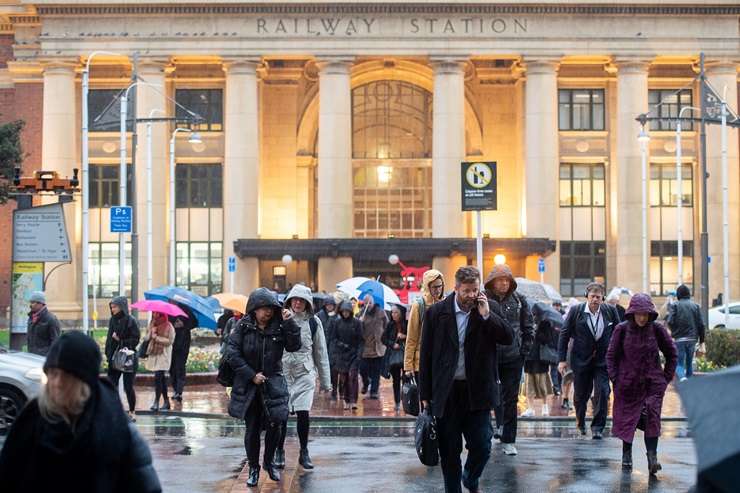
Pedestrians wait to cross a road outside Wellington Railway Station. The region is reeling from recent job cuts. Photo / Getty Images
“However, there will be a difference between the perceived impacts and real impacts, in that the market will continue to transact as it always does – but there will be pockets of difficult times for some people.”
In Upper Hutt, Ledger’s agents has 33 properties listed for sale. “It’s a buyer’s market in Upper Hutt at the moment [although] buyer numbers are well down,” he said.
“Last weekend we had around 24 open homes and were averaging two people per open home if we were lucky, whereas back in 2020 to 2021 we’d see 35 groups of buyers through one open home.”
However, the market is in a much better place now than it was during the slump. Homes in Upper Hutt are taking around 50 days to sell. That’s an improvement from July last year when days on market reached 112.
Sales volumes have also picked up. Figures from the Real Estate Institute of New Zealand show the number of homes sold in Upper Hutt in April was up almost 70% year-on-year (sales for the region as a whole were 22% over the same period).
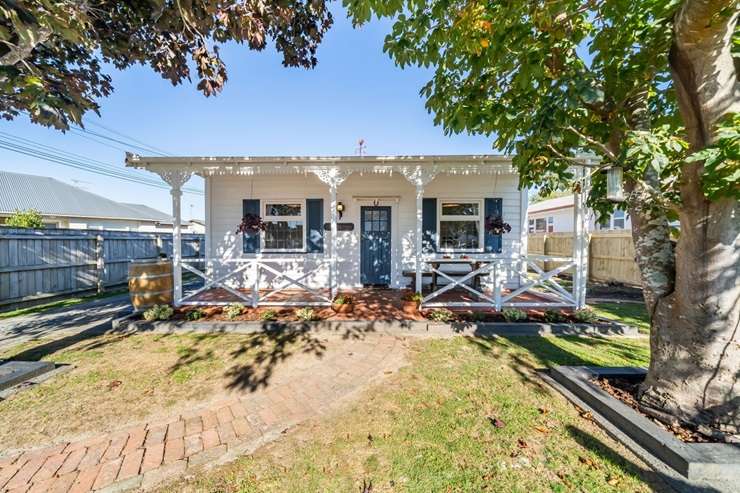
31 Merton Street, in Trentham, is targeting buyers with more than $699,000 to spend. Photo / Supplied
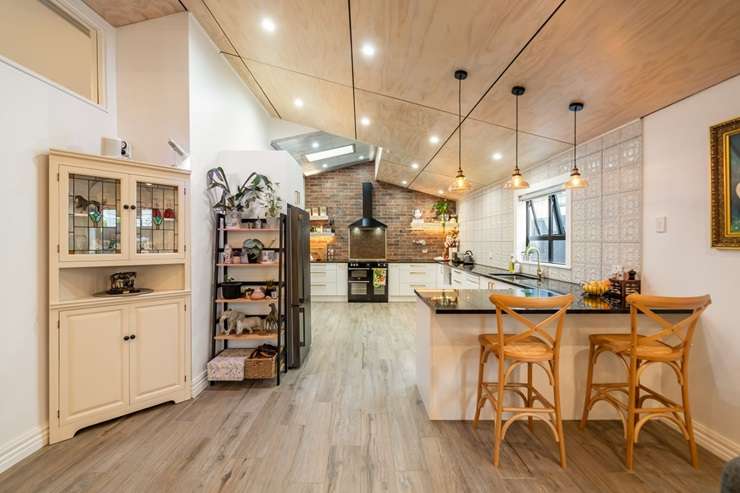
At the upper end of the market is 54 Granville Street, in Silverstream, which is looking for buyer enquiry over $1.059m. Photo / Supplied
Ledger said the deals were still hard to get across the line. “It’s a really tough market, where in order to get properties sold we’re having to do a lot more work – bringing in the buyers and holding onto them and making deals work,” he said, noting that a lot of renegotiations can take place after offers are made and accepted.
“Buyers sell their house for potentially less than what they’re expecting to get, then we’re having to renegotiate with the vendor at the other end. So there’s a whole lot of back and forth and a bit of commission cutting. Everyone’s robbing Peter to pay Paul and everyone has to hurt a little bit to make things happen.”
The agents OneRoof talked to all singled out first-home buyers as being strong in the market.
In Upper Hutt, thanks to lower prices, around 35% of buyers are first-timers. “First-home buyers are going, ‘I could spend $750,000 on a two-bedroom apartment with no garage in Wellington City or I can spend $750,000 in Upper Hutt and have a four-bedroom house with a double garage and 500 squares of land’,” said Ledger.
An example of value on offer outside the capital is a four-bedroom home at 31 Merton Street, in Trentham, which is seeking buyer enquiry over $699,000.
For those with bigger budgets, Ledger has a three-bedroom refurbished character home at 54 Granville Street, in Silverstream, which is looking for buyer enquiry over $1.059m.
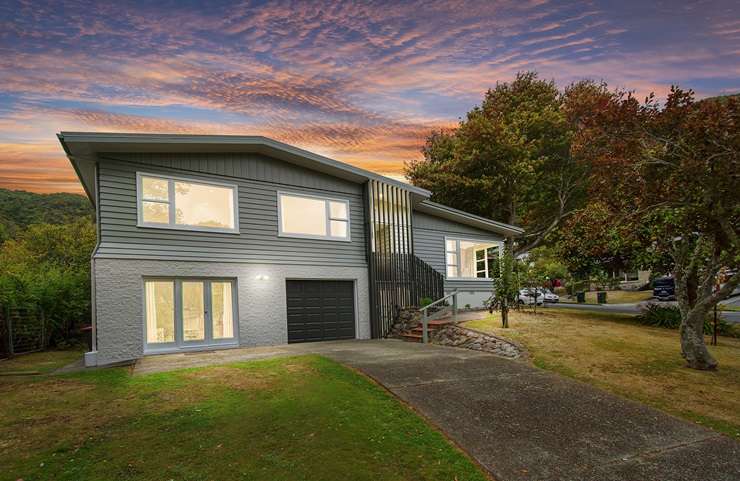
A four-bedroom renovated family home on Cleary Street, in Waterloo, recently sold for $1.18m. Photo / Supplied
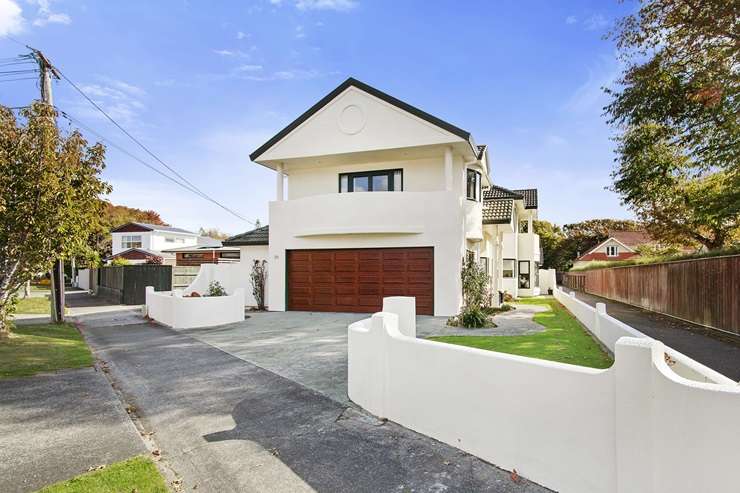
A four-bedroom luxury home for sale at 59 Hautana Street, in Woburn. Photo / Supplied
Matthews said the “first-home market is still quite busy, but buyers are extremely cautious. The banks are obviously tough as well. You can only borrow a certain amount”.
Entry-level homes in Wainuiomata, Stokes Valley, Taitā, and Naenae range in price from the high $500,000s to $650,000. “It would be your classic Kiwi 1960s home. You get three bedrooms and one bathroom on quite a reasonably big section with a garage as well. Two years ago, they were around the $800,000 mark. That’s a pretty good reason to get in, really.”
The middle bracket from $900,000 to $1.1m is a little bit sluggish because there are a lot of homes on the market, “so buyers have got a huge amount of choice”.
“Well-presented houses that have been renovated or have new bathrooms or new kitchens and stuff like that, are still selling. But ones that require renovation and a bit of work are extremely sluggish, and they’re taking a lot longer to sell,” he said.
“I think mainly that’s because of the cost of renovating and the perception that building costs are actually still quite high.”
Matthews said he can’t see the Lower Hutt market picking up in the next six months if interest rates remain high. “With interest rates where they are, if you’re on low income, you simply can’t afford the repayments. The other two factors here currently are you have a cost of living crisis and the cost of insurance has just gone mental.”
Rising insurance premiums are one of the reasons Petone homes in particular have gone off the boil, he said.
Vendors across Lower Hutt were having the meet the market in order to sell. Matthews said he recently sold a four-bedroom family home on Cleary Street, in Waterloo for $1.18m.
The vendors, who are moving to Australia, had paid $1.05m for the home in 2020 and spent $200,000 on renovations, said Matthews.
The agent has another stylish family home on the market for sale. The four-bedroom luxury house at 59 Hautana Street, in Woburn, is expected to fetch around its 2022 RV of $1.48m.
The stumbling block is that homeowners are hesitant to upgrade. “I don’t think anyone will be looking at upsizing any time soon. People who want to upgrade from $1.1m to $1.4m market are sitting on their hands.”
- Click here to find more properties for sale in Wellington
















































































